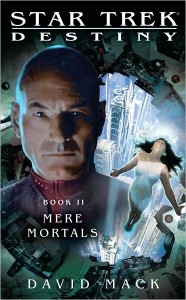 As the Borg continue their relentless, unstoppable assault upon the Alpha Quadrant, the Federation and its allies examine every possible solution in the hopes of preventing an otherwise-inevitable extinction. Entire worlds are dying, and the clock is ticking, while Starfleet’s finest ships desperately pursue various avenue. The U.S.S. Enterprise, as usual, is at the forefront of the action, with Captain Picard determined to hold the line against the invading Borg. Teamed up with Captain Ezri Dax and the U.S.S. Evantine, they begin to explore a number of recently-discovered subspace tunnels, convinced that one such aperture holds the secret to the Borg’s new method of instantaneous cross-galaxy travel. Meanwhile, the U.S.S. Titan has stumbled across the same xenophobic, powerful alien culture that ultimately spelled doom for the lost Columbia, centuries ago. Back home, Federation President Bacco uses every political trick she knows to convince the Federation’s allies and enemies to join in a common defense of the Quadrant. With things truly heating up, it’s swiftly clear that this is the make or break moment for the sentient beings of the Alpha Quadrant. The Borg are no longer interested in assimilation… only extermination.
As the Borg continue their relentless, unstoppable assault upon the Alpha Quadrant, the Federation and its allies examine every possible solution in the hopes of preventing an otherwise-inevitable extinction. Entire worlds are dying, and the clock is ticking, while Starfleet’s finest ships desperately pursue various avenue. The U.S.S. Enterprise, as usual, is at the forefront of the action, with Captain Picard determined to hold the line against the invading Borg. Teamed up with Captain Ezri Dax and the U.S.S. Evantine, they begin to explore a number of recently-discovered subspace tunnels, convinced that one such aperture holds the secret to the Borg’s new method of instantaneous cross-galaxy travel. Meanwhile, the U.S.S. Titan has stumbled across the same xenophobic, powerful alien culture that ultimately spelled doom for the lost Columbia, centuries ago. Back home, Federation President Bacco uses every political trick she knows to convince the Federation’s allies and enemies to join in a common defense of the Quadrant. With things truly heating up, it’s swiftly clear that this is the make or break moment for the sentient beings of the Alpha Quadrant. The Borg are no longer interested in assimilation… only extermination.
Even as things swiftly escalate beyond the point of no return, people still find time to worry about the smaller things. Deanna Troi struggled with a pregnancy that might just kill her. Geordi LaForge shares flirtations with another engineer. Ezri Dax and Worf meet for the first time in quite a while, to deal with their shared history. And the tragic saga of the Columbia and her crew unfolds in its entirety, a tale taking place over a matter of centuries. But all of it may mean nothing as the book closes on a cliffhanger, one of epic proportions, with the stage set for the last book in the trilogy.
Once again, David Mack juggles a cast of thousands and a dozen major and minor plot threads as he tells one of the most ambitious, far-reaching, potentially universe-changing stories of the Star Trek setting. We’ve already seen some major and minor characters change and/or die in recent books, and with the exception of some core characters, it’s clear that no one’s entirely safe anymore. From massive starship fleets, to technobabble, from cute character moments to visceral combat scenes, from strange new worlds to alien civilizations, this book has all of those things which make Star Trek what it is. A fan can’t ask for much more.
Mind you, Mack really raises the stakes with the ending of this book, and I’m quite curious to see how it’s all going to be resolved. At this point, it’ll call for one heck of a deus ex machina — with several possibilities introduced through the course of the storyline — and he’ll have to be very careful how it’s applied so the audience doesn’t cry shenanigans over the ending. I also anticipate a heroic sacrifice or two along the way, since that’s how these things always go.
One thing I really liked was the political maneuverings of President Bacco, dealing with the various ambassadors from the Ferengi, the Gorn, the Tholians, the Romulans and so forth, as she bribed, cajoled, and manipulated them, not just to secure them as allies, but to protect the Federation’s borders against the more opportunistic factions. There was some nice chicanery and clever dealing involved here, and Mack played out the intrigue nicely. I must admit, I had to do a little research to refresh my memory on who some of these races are, as I was never more than a casual viewer of the shows. He’s done his homework, that’s for sure.
I’ll sign off with the usual caveat: This book is mired in continuity stemming from decades’ worth of television episodes and literary explorations of the setting, and it’s the second in a trilogy which is the capstone to an arc running through a number of books. Newcomers would be advised to, at the very least, check out the first in the trilogy, Gods of Night, or start even further back with Resistance, by J.M. Dillard for the start of this current Borg-related saga. I think that existing fans will be pleased by this installment.
Originally reviewed for SF Site, 2009
